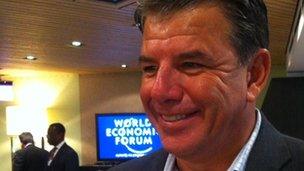Davos 2013: Firms risk drowning in customer data
- Published

Mr Ersek says Western Union works hard to understand the needs of its customers
Tick, tock, tick, tock. Every second of every minute of every hour, Western Union makes 28 financial transactions, typically $350 (£220) each.
Unlike ordinary retail transactions, the money is often sent by migrants to pay school fees or hospital bills for their families back in their home countries.
And as such, says Hikmet Ersek, chief executive of Western Union, many of the transactions are life-changing.
"We are serving the underserved," Mr Ersek says in an interview with BBC News.
"Not the under-banked. Some 70% of our customers have bank accounts, but their banks don't talk to banks in other parts of the world."
'Multicultural competence'
With some 500,000 retail outlets, three quarters of which are based on agreements with local banks or other financial institutions, Mr Ersek's business is hugely complex.
Yet, in spite of this, and though the company's traditional business is combined with a fast-growing online money transfer business, the complexity does not lie with the sheer mass of data per se, he insists.
Instead, what is crucial is to analyse the data, not only to see the big picture, but also to develop a deep and localised understanding of some 180,000 customers in 200 countries.
In other words, to understand Western Union's "ethnic customers", the plethora of data must be translated into "multicultural competence", Mr Ersek insists.
Understanding customers
Mr Ersek sees universality in the data; migrant workers in wealthy countries often send money back to the developing nations they are from; or 80% of cruise ship workers come from Asia, so it makes sense to set up money transaction services onboard ships.

Almost all of Western Union's customers in India and across Africa want to get their money in cash
Offering special deals around, say, religious holidays when believers might want to send gifts, or before the start of term at universities when foreign students' parents might want to transfer money to pay tuition fees, are examples of responses to such universality.
But Western Union also responds to customers' specific needs at quite a granular level.
Marketing and communication with customers will take place in their own language, and they will be offered solutions that are appropriate to their expertise, their location and their cultural tastes.
So, Indian IT workers in California are offered apps for their gadgets, so they can electronically transfer money to local, perhaps rural, outlets in India where their parents will be able to pick up cash.
"There is always a perception that cash is dead," says Mr Ersek, "but in India, 98% of transactions are cash, and in Africa it's 99%".
Tech-heavy firms
Such an ability to understand data about consumers at a human level is increasingly considered essential by business leaders at the World Economic Forum's annual meeting in Davos.

Western Union has outlets around the world
"Companies used to have a competitive advantage if they owned a lot of information, but these days there is more knowledge outside the enterprise than within it," according to one delegate, a chief executive in the technology sector.
At various sessions attended by business leaders and politicians, the so-called explosion in "big data" hammers home one essential point - most companies are far from ready to make sense of it all.
This is not because of a lack of technological tools, says one chief executive of an advertising company, but rather because the people who tend to know about data handling also tend to be engineers.
"Half our people are PhDs or engineers and many of the others are technologists," adds the chairman of a defence company, while the chief executive of a computer company bemoans the fact that "95% of our people are engineers, and engineers are not that good at handling ambiguity".
Economic case
Automated data handling, coupled with savvy interpretation by human beings, is set to revolutionise a string of industries, many World Economic Forum delegates predict.
Many services currently offered by people will be automated, the way manufacturing has been automated in the past, according to one prediction.

Western Union's commission rate is 4%-5%
And digital diagnostics and treatment systems are going to be central to the continuing development of more cost-effective personalised medicine, according to government officials, regulators, private sector investors and insurers operating in the healthcare sector.
The potential for improving people's lives is obvious and, if all goes according to plan, there might even be profits to be made - though the business plans have yet to be hammered out.
By comparison, Western Union's ability to please both customers and shareholders is already clear.
Mr Ersek says he was once told how a money transfer to a regional outlet in rural Africa helped save an elderly mother a 20-mile walk to get the cash she needed to pay her hospital bill.
And the customer is not the only one to benefit. With annual transfers to the tune of some $190bn, earning an average commission of 4-5%, there should be plenty left for investors too.
You can follow Jorn's coverage from Davos on Twitter @jornmadslien., external